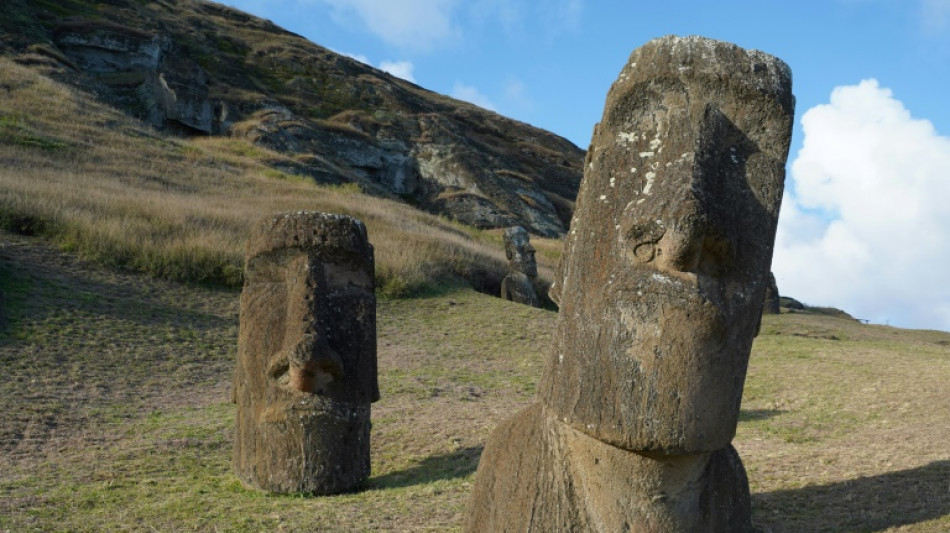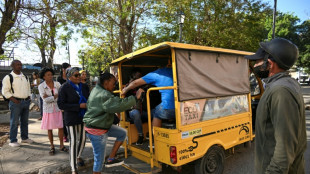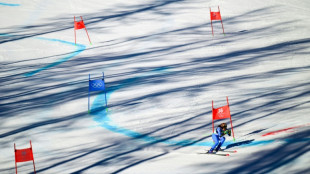
-
 Rayo thrash Atletico who 'deserved to lose' as Betis cut gap
Rayo thrash Atletico who 'deserved to lose' as Betis cut gap
-
Napoli salvage point after Malen twice puts Roma ahead

-
 Lyon down Nice to boost Ligue 1 title bid with 13th straight win
Lyon down Nice to boost Ligue 1 title bid with 13th straight win
-
LeBron still unclear on NBA future: 'I have no idea'

-
 Shelton battles back from brink to beat Fritz, take Dallas crown
Shelton battles back from brink to beat Fritz, take Dallas crown
-
Great Britain celebrate best-ever Winter Olympics

-
 Brignone wins second Milan-Cortina gold as Klaebo claims record ninth
Brignone wins second Milan-Cortina gold as Klaebo claims record ninth
-
Arteta concerned over Arsenal's mounting injury list

-
 In fuel-starved Cuba, the e-tricycle is king
In fuel-starved Cuba, the e-tricycle is king
-
Shaidorov still spinning after outshining Malinin for Olympic gold

-
 Late Gruda goal grabs Leipzig draw versus Wolfsburg
Late Gruda goal grabs Leipzig draw versus Wolfsburg
-
'Ultra-left' blamed for youth's killing that shocked France

-
 Canada wrap up perfect Olympic ice hockey preliminary campaign
Canada wrap up perfect Olympic ice hockey preliminary campaign
-
Historical queer film 'Rose' shown at Berlin with call to action

-
 Wales' Tandy tips hat to France after Six Nations hammering
Wales' Tandy tips hat to France after Six Nations hammering
-
Quadruple chasing Arsenal rout Wigan to reach FA Cup fifth round

-
 2026 S-Class starry facelift
2026 S-Class starry facelift
-
What they said as India beat Pakistan at T20 World Cup - reaction

-
 Away-day blues: England count cost of Scotland Six Nations defeat
Away-day blues: England count cost of Scotland Six Nations defeat
-
'Wuthering Heights' debuts atop North America box office

-
 Rayo thrash Atletico who 'deserved to lose'
Rayo thrash Atletico who 'deserved to lose'
-
Kok beats Leerdam in Olympic rematch of Dutch speed skaters

-
 India rout bitter rivals Pakistan by 61 runs at T20 World Cup
India rout bitter rivals Pakistan by 61 runs at T20 World Cup
-
France run rampant to thrash sorry Wales 54-12 in Six Nations

-
 Rio to kick off Carnival parade with ode to Lula in election year
Rio to kick off Carnival parade with ode to Lula in election year
-
Britain celebrate first-ever Olympic gold on snow after snowboard win

-
 Third time lucky as De Minaur finally wins in Rotterdam
Third time lucky as De Minaur finally wins in Rotterdam
-
Leeds survive Birmingham scare to reach FA Cup fifth round

-
 Klaebo wins record ninth Winter Olympics gold medal
Klaebo wins record ninth Winter Olympics gold medal
-
Fan frenzy as India–Pakistan clash in T20 World Cup

-
 French 'Free Jazz' pioneer Portal dies aged 90
French 'Free Jazz' pioneer Portal dies aged 90
-
China's freeski star Gu says Olympics scheduling 'unfair'

-
 Kishan hits quickfire 77 as India make 175-7 in Pakistan showdown
Kishan hits quickfire 77 as India make 175-7 in Pakistan showdown
-
Shiffrin takes positives after falling short in Olympic giant slalom

-
 Oh! Calcutta! -- how did England lose to Scotland in Six Nations?
Oh! Calcutta! -- how did England lose to Scotland in Six Nations?
-
Brignone strikes Olympic gold again as Klaebo becomes first to win nine

-
 Marseille sporting director Benatia quits club
Marseille sporting director Benatia quits club
-
History-maker Brignone completes Olympic fairy tale as Shiffrin's medal misery continues

-
 Brignone claims second Olympic gold, Shiffrin misses podium
Brignone claims second Olympic gold, Shiffrin misses podium
-
Evans wins Rally Sweden to top championship standings

-
 No handshake between India, Pakistan captains before T20 World Cup clash
No handshake between India, Pakistan captains before T20 World Cup clash
-
French 'ultra-left' behind killing of right-wing youth: justice minister

-
 Forest appoint Pereira as fourth boss this season
Forest appoint Pereira as fourth boss this season
-
Norwegian cross-country skier Klaebo wins a Winter Olympics record ninth gold

-
 'King of the Moguls' Kingsbury bows out on top with Olympic dual moguls gold
'King of the Moguls' Kingsbury bows out on top with Olympic dual moguls gold
-
Hiam Abbass says 'cinema is a political act' after Berlin row

-
 'Imposter' Nef shooting for double Olympic gold
'Imposter' Nef shooting for double Olympic gold
-
Brignone leads giant slalom in double Olympic gold bid, Shiffrin in striking distance

-
 After Munich speech, Rubio visits Trump's allies in Slovakia and Hungary
After Munich speech, Rubio visits Trump's allies in Slovakia and Hungary
-
England's Banton at home in first World Cup after stop-start career


'Ecocide' on Easter Island never took place, studies suggest
Two recent studies have cast doubt on a popular theory that the ancient residents of Easter Island suffered a societal collapse because they overexploited their natural resources, an event often labelled one of history's first "ecocides".
Easter Island, located in the Pacific Ocean 3,700 kilometres (2,300 miles) from the coast of Chile, is best known for the enigmatic "moai" stone statues of humans carved by the Rapanui people.
A widespread theory popularised by historians including US author Jared Diamond claimed that the Rapanui deforested the small island -- which is known to have once been covered in palm trees -- to keep supporting the flourishing culture of its more than 15,000 inhabitants.
The sudden lack of resources is said to have triggered a brutal period of famine and warfare that escalated into cannibalism and ended in a demographic and cultural collapse.
This event in the 1600s abruptly brought an end to the creation of new moai statues -- or so the story goes.
When Europeans first arrived at the island in 1722, they estimated there were only around 3,000 inhabitants.
This tale of ecological suicide -- or "ecocide" -- by the Rapanui "has been presented as a warning tale for humanity's overexploitation of resources," according to the authors of a study published in the journal Nature on Wednesday.
The international team of experts in population genetics tried to find signs of the societal collapse using an advanced statistical tool that reconstructs the genomic history of a people.
They analysed the genomes of 15 Rapanui who lived between 1670 and 1950 -- and found no sign of a societal collapse, which would have caused a sudden reduction in genetic diversity.
"Our genetic analysis shows a stably growing population from the 13th century through to European contact in the 18th century," said study author Barbara Sousa da Mota of the University of Lausanne.
"This stability is critical because it directly contradicts the idea of a dramatic pre-contact population collapse."
The research also shed light on contact between the island's residents and Native Americans well before Christopher Columbus arrived in the Americas -- another controversial moment in the history of the Polynesian people.
- Different method, same conclusion -
The new research reinforced the findings of a different study published in June in the journal Science Advances which took a very different approach.
That the two studies reached the same conclusion "shows the importance of looking at the same scientific question from different disciplines," Sousa da Mota told AFP.
The team behind the June study used satellite images to map out rock gardens on the island. Rock gardening is an agricultural method that involves mixing rocks into the soil to preserve nutrients and moisture.
Previous research had claimed that up to 21 square kilometres of the small island -- 12 percent of the total of 164 square kilometres -- was covered with these gardens, which would have been necessary to sustain more than 15,000 people.
- 'We can learn from them' -
But the US-based researchers determined that only 0.76 square kilometres of the island were used as rock gardens.
Such a small harvest of sweet potatoes -- essential to the Rapanui's diet -- from these gardens could not have supported more than 4,000 people, the researchers estimated.
That is close to the number of people that Europeans first found on the island, indicating there never was a society of 15,000 or more that endured a terrifying collapse.
"When we label an entire culture as an example of bad choices, or as a cautionary tale of what not to do, we had better be right, otherwise we feed stereotypes (which themselves have profound consequences on people)," Dylan Davis, a co-author of the Science Advances study, told AFP.
"In this case, the Rapanui managed to survive in one of the most remote places on Earth and did so fairly sustainably until European contact," said the environmental archaeologist at Columbia University.
"This suggests we can learn something from them about how to manage limited resources."
M.Thompson--AMWN